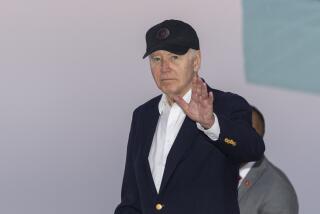The splash is back for high rollers
The days of big spending are over for many Americans, but not for the high rollers. They just need a little encouragement to trigger that buying feeling.
On a recent weekday night in the Hollywood Hills, jeweler Damiani and lifestyle magazine Angeleno took over a $9-million house with views of Los Angeles to throw a lavish party for potential customers.
About 40 men in dark suits and women wearing pearls dined on frisee and filet mignon, then sipped champagne as they gazed at jewelry displays illuminated by eco-friendly fireplaces, watched videos of yachts with “Damiani” on their sails and ate coconut raspberry cake in the shape of a diamond.
Such parties are becoming more common, and more extravagant, as marketers try to connect with rich clients in tough economic times.
Over-the-top affairs are out of the question for most companies as they try to tone down their marketing campaigns to match their shrinking revenue and the gloomy mood of consumers. But in luxury marketing, splashy events are back in vogue.
“In turbulent times, when consumer confidence is decreasing and consumption habits are changing, the most important thing is to gain loyalty from the core customer,” said Claudia D’Arpizio, a luxury analyst with consulting firm Bain & Co.
Upscale brands need to do something to keep the customers buying. Bain predicts that in 2009 the so-called luxury market -- brands sold in upscale department stores and advertised in high-end fashion magazines -- will face its first recession in six years, with a 7% decline in global sales. MasterCard SpendingPulse said luxury sales dropped 20% in October from a year earlier. And luxury jewelry retailer Tiffany & Co. recently cut its annual financial forecast and said sales in stores open at least a year had worsened from October to November.
Luxury brands have to adjust. As part of a strategy to expand their customer base, they have spent the last few years opening new stores across America and reaching out to mass-market consumers.
But the economic slowdown is forcing them to focus on their core customers: high-net-worth individuals capable of spending thousands of dollars in one visit. Price cuts risk backfiring by diminishing a brand’s exclusive image, so brands are reaching out on a personal level.
“We’re trying to be much more targeted and give customers a more intimate experience with our brand,” said Laurie Patruno, boutique manager for the new Damiani store on Rodeo Drive, which has received clients as a result of the dinner. “These days, you need to be very efficient with your marketing dollars.”
Events have long been a staple of marketing luxury goods, but now it’s not enough just to invite customers into stores or send them discount offers in the mail. Retailers must go to extreme lengths to attract the interest of top spenders, said Alan Klein, Angeleno’s president and group publisher.
He pointed to a recent example in which a high-end marketer invited potential clients to fly MiG jets. In Toronto, American Express invited its best clients to a dinner party -- in a room suspended 160 feet in the air by a crane -- that featured food from some of Canada’s top chefs, said David Ghysels, a partner at Events in the Sky, which put on the dinner.
“The market’s saturated; there are many, many events going on,” said Dawn Moore, general manager of pearl store Mikimoto in Beverly Hills. “It’s a new game and it takes a lot of creativity.”
Equinox, the chain of posh fitness clubs, has recently eschewed billboard and magazine ads. It instead threw a party for a new gym opening, said West Coast marketing manager Christopher Lam. Equinox invited potential customers “with a certain salary” who worked at nearby companies to a bash where they were greeted by models, danced to music spun by DJ Splyce, noshed on tuna tartare and beef carpaccio, and left with $150 gift bags that included spa items, guest passes, clothing and silver bags.
“We found that it was more of an engaging experience to have them come and enjoy themselves at a different setting,” he said.
Lam says the event was a success: Nine of the 170 attendees signed up as Equinox members, and people in the area were buzzing about the party for weeks.
Another benefit of the approach: Friends tell their friends when they feel well taken care of, making the parties an effective form of word-of-mouth marketing for the sponsors.
Expensive parties and daring experiences are effective marketing tactics because they aren’t obvious advertising efforts, said Lisa Gild, marketing director at Angeleno. “The affluent audience doesn’t want to be sold to.”
Of course, brands still do the selling. At a black-tie event for VIPs, jet maker Bombardier served wine and champagne at a bar flanked by a big-screen TV showing interiors of its planes.
At another event, Emirates Airlines paid singer Ricky Martin more than half a million dollars to perform at a party kicking off its entry into the Los Angeles market (Martin changed the words of a song to mention Dubai, where the airline is based). Guests chose from menu options such as “A California collection of luxury West Coast seafood with lobster, king prawn and a timbale of crab with avocado, tomato and Meyer lemon puree,” and they left with a glossy coffee-table book about Emirates.
At the Damiani-Angeleno event, the companies’ brands -- along with others including Fiji Water -- were printed on the menu and splashed on door-sized posters around the house. Damiani staff members at the dinner party wore sample diamond jewelry worth tens of thousands of dollars.
That the events are getting more lavish at a time of rising unemployment and economic uncertainties isn’t lost on guests or planners, but they defend the marketing tactics by saying that they’re smart business.
“Commerce has to go on,” said Nicholas Frankl, founder of Entertainment MarketPlace, which puts on marketing events for such companies as Mikimoto and luxury carmakers Bugatti and Jaguar.
Some brands, aware that spending millions on parties in the current economy might seem too extravagant, are partnering with nonprofits to add what they call an emotional aspect to their marketing campaigns. The Damiani-Angeleno event raised money for inner-city art programs. And during a ball sponsored by Lugano Diamonds that raised money for cancer research, guests watched as a cancer patient met, for the first time, a man who had given him bone marrow.
“The nonprofit element of these parties certainly would alleviate the apparent gluttonous nature,” said David Winter, president of the Luxury Marketing Council of Southern California.
For many attendees, though, extravagance isn’t a negative. Many are unapologetic about the fact that they have money and aren’t changing their behavior much in the current economy, Winter said. That’s why the lavish parties aren’t a waste of money for luxury retailers.
“At these events, they’re not spending it away,” he said. “It’s a marketing expense.”
--
More to Read
Inside the business of entertainment
The Wide Shot brings you news, analysis and insights on everything from streaming wars to production — and what it all means for the future.
You may occasionally receive promotional content from the Los Angeles Times.











